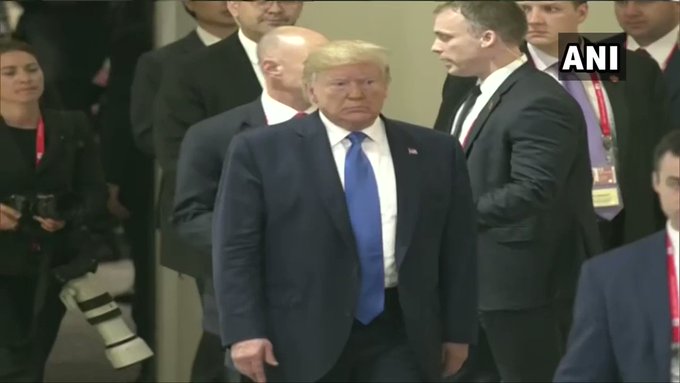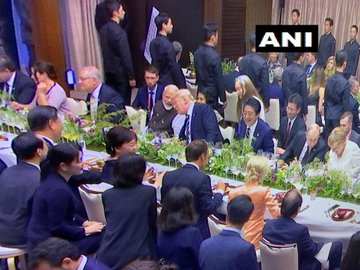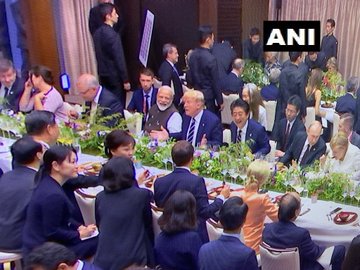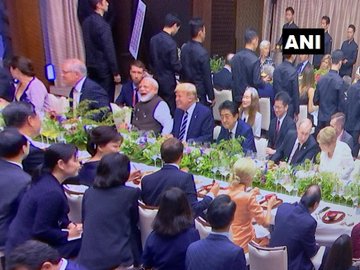New Delhi and Washington have been scrambling to minimise the cost of the political firestorm, with supportive messages from other wings and branches of the US government.
After President Donald Trump made an incendiary claim that Indian Prime Minister Narendra Modi asked him to mediate on Kashmir, both New Delhi and Washington have been scrambling to minimise the cost of the political firestorm, with supportive messages from other wings and branches of the US government.
With visiting Pakistan Prime Minister Imran Khan on his side, Trump claimed that during their meeting at Osaka, Modi had asked him to be a “mediator or arbitrator” on Kashmir.
Within a couple of hours, India moved fast to issue a denial, just two minutes before midnight in Delhi. Later on Tuesday morning, external affairs minister S. Jaishankar “categorically” assured both houses of parliament that “no such request was made by the Prime Minister to the US President”.
From the US side, the official response came a few hours later with a tweet from acting assistant secretary of state, Alice G. Wells. Without referring to Trump’s remarks she reiterated the traditional US position that Kashmir is a bilateral dispute, and India and Pakistan should talk to each other.
While the Indian statement was categorical, the specificity of Trump’s so-called recollection of their conversation apparently led officials of both sides to check their written records of the meeting on June 28.
There was not even a mention of Kashmir in the records, as per sources. The US also informed India that a scan of their own records also brought up a similar absence of Kashmir at G-20 summit.
On Tuesday morning in Washington, the state department spokesperson also mirrored acting assistant secretary Well’s words that Kashmir is a bilateral dispute. She added that US would welcome India and Pakistan “sitting down” and was ready “to assist”.
The spokesperson said that the “first and foremost” step to create an atmosphere conducive for dialogue would be tackle the “menace of terrorism”.
When asked about the claims made about Trump-Modi meeting at Osaka, she said that there are usually “no (public) comments or readouts of President’s meeting”. The spokesperson also said that the two leaders “may have” have talked about the need for Pakistan to take “irreversible” action against terror groups based on its soil.
This line echoed the phrase in the “fact sheet” issued ahead of the conclusion of the bilateral meeting between the US President and Pakistan prime minister.
Indian officials were pleased that the “fact sheet” stated that Pakistan had to take action to “shut down all groups once and for all”. The sentence before this phrase also acknowledged that Pakistan had taken “some steps against terrorist groups operating within Pakistan”.
The Indian government’s statement, while definite in denying Trump’s claims, had to also take into account that the US president cannot be publicly called out for his verbal innovations.
As sources indicated, the Indian government will have to deal with Trump for another year and a half. If he wins the re-election bid in 2020, it means yet another four years.
‘Will not impact India-US relationship’
No country has yet learned how to handle the unpredictability of President Trump, so his surprising statements are now taken in stride, they added. Officials asserted his ‘inventive’ words will not actually impact the India-US relationship, which is largely managed by more junior administration officials and career bureaucrats.
During the parliament proceedings, the opposition may keep asking for a statement from Modi, but the government plans to ignore it for now. The strategy is not to intentionally stretch out this controversy, with the bet being that mainstream media would also move on to the next topic within a day or two, if they were starved of any “developments”.
In Washington, US officials have to walk a more precarious line. Not only they can’t publicly repudiate their leader, but US officials had to factor in the ongoing visit by a foreign leader, whose cooperation was required for an issue close to Trump’s heart.
For Trump, the key sign of success for Khan’s visit would be to get an assurance on Afghanistan, so that a quick peace agreement with Taliban could lead to all US troops returning home. Pakistan has been quick to grasp this opportunity, with Imran Khan effusively complimenting him that they are both on the same page.
Therefore, not surprisingly, the tweet from the US state department senior official made no reference to Trump’s actual words, which could have been interpreted as a denouncement.
After the Oval Office press interaction, voices from the Democrat-controlled house of representatives of the US legislative branch, the Congress, reiterated that Kashmir was a “bilateral dispute”.
Democrat Brad Sherman was the most outspoken, describing Trump’s words about Kashmir mediation as “amateurish” and “embarrassing”. Sherman also said that he had apologised to the Indian ambassador to the US, Harsh Shringla.
The senior Indian diplomat also spoke to the chairman of the House Foreign Affairs committee, Democrat Eliot Engel, who stated that pace and scope of any dialogue will have to be determined by India and Pakistan. “He reaffirmed that in order for dialogue to be meaningful, Pakistan must first take concrete and irreversible steps to dismantle the terrorist infrastructure on Pakistan’s soil,” added the read-out issued by the House committee.
The co-chairs of the bipartisan Congressional Caucus on India and Indian Americans also issued a statement that they wanted a bilateral resolution to the Kashmir dispute “consistent with decades of US policy”.
Making no reference to Trump or his words, they said, “The Republic of India is one of America’s closest and most important allies, and we look forward to working with Prime Minister Modi and Indian officials to combat terrorism and extremism throughout the region.”





No comments:
Post a Comment